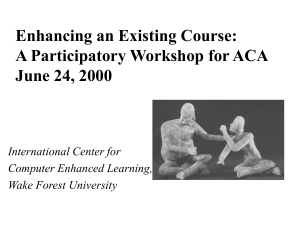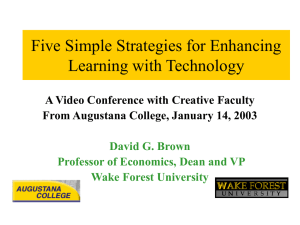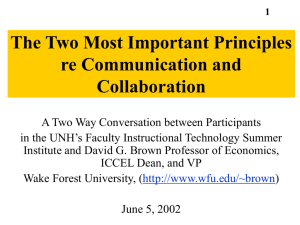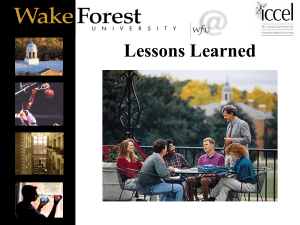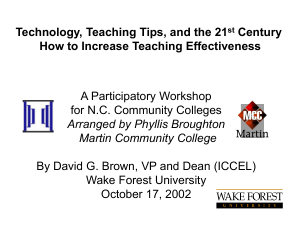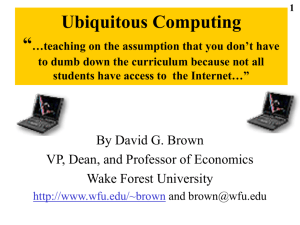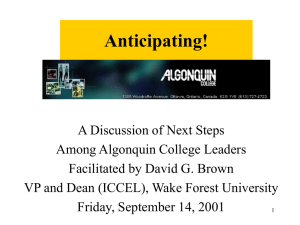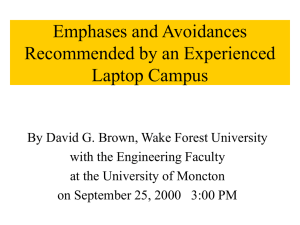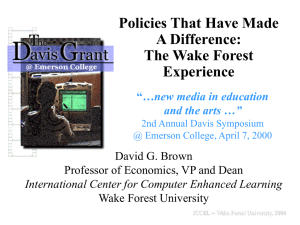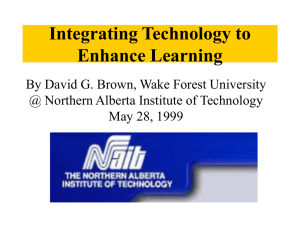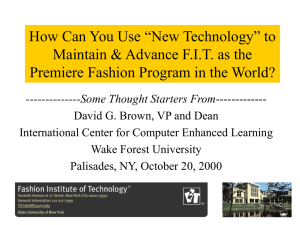Enhancing an Existing Course: A Participatory Workshop February 10, 2001 International Center for
advertisement
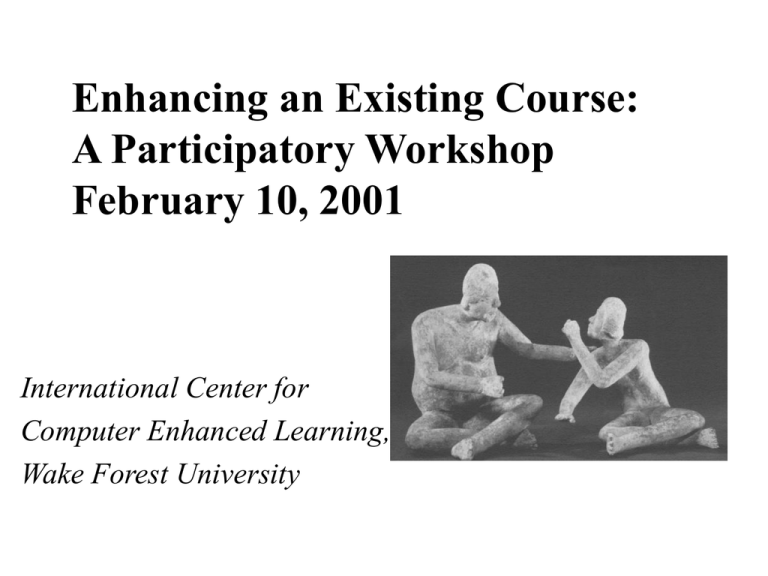
Enhancing an Existing Course: A Participatory Workshop February 10, 2001 International Center for Computer Enhanced Learning, Wake Forest University Quick Start: 5 strategies pursued by many early Your Personal Educational Convictions & Theories adopters 6 easy-to-learn computer techniques (for implementing the 5 strategies) List the Changes You Wish to Try in Your Specific Course Beginning Assumptions • Start by enhancing an existing course, not total redesign! • Use only techniques that can be learned by faculty in less than an hour! • Expect network reliability and access to knowledgeable help when needed! • Recognize that no experiment can jeopardize the success of a student cohort (Garden Metaphor) Beginning Guidelines • Don’t get too ambitious. Know your limits. Start by enhancing, not redesigning. • Emphasize learning strategies, not technology • Keep the technology simple (not as much for the students as for you) The Big Five #1. Continuous Communication #2. Preview and Review #3. Controversy and Debate #4. Different Strokes, Different Folks #5. Outsider Involvement It’s Your Turn • Think of a specific course, preferably one that you are planning to enhance. • List 2-3 “activities-assignments” that you are currently using that reinforce the concept of “continuous communication,” then of “repetition”, then of ... Think about non-technological activities as well as computer based activities! • Write down the activities. This is important! Continuous Communication Preview & Review Involve Controversy Outsiders Debate Different Strokes The Low Hanging Six Email & Listservs URL addresses (in syllabus) Annotations within word processed documents Powerpoint “lecture outlines” Mini-movies that show successive computer screens Course Management System (CourseInfo) GIZ Ways of Thinking About Presidential Campaigns and Debates A First Year Seminar Introducing Students to the Liberal Arts 15 Freshmen Meet twice per week All with open laptops ICCEL -- Wake Forest University, 2001 COURSE OBJECTIVES • To understand a liberal arts education as an opportunity to study with professors who think by their own set of concepts • To learn how to apply economic concepts • To learn how to work collaboratively • To learn computer skills • To improve writing and ICCEL -- Wake Forest University, 2001 Learning is enhanced by• • • • • • • Collaboration among Learners Frequent student/faculty dialogue Prompt Feedback Application of Theory Student Self Initiatives Trustful relations Personal & Individual Teaching ICCEL -- Wake Forest University, 2001 Brown’s First Year Seminar • Before Class – Students Find URLs & Identify Criteria – Interactive exercises – Lecture Notes – E-mail dialogue – Cybershows • During Class – – – – – One Minute Quiz Computer Tip Talk Class Polls Team Projects Chat During Lecture • After Class – – – – Edit Drafts by Team Guest Editors Hyperlinks & Pictures Access Previous Papers • Other – – – – – Daily Announcements Team Web Page Personal Web Pages Exams include Computer Materials Forever ICCEL -- Wake Forest University, 2001 GIZ Integration & Action 1. “Tease Out” Your Educational Beliefs in Several Ways” 2. Then, match up beliefs with strategies and tools . 3. Then, decide what you want to do! What Works for You? [6 Ways to “tease out” your answer] • Types of assignments and/or lectures that seem to be most effective? Want to give your student more of what? • Your philosophy of teaching? • Idea behind your course? • Metaphors for your role? • 3 Most Important Principles of Good Teaching? • Diagram? ICCEL -- Wake Forest University, 2000 Metaphors for Professors’ Role • Coach and team • Master and apprentices • Sage on the Stage • Guide by the Side • Fountain of Information • Salesperson ___________________ ICCEL --•Wake Forest University, 2000 Student Knowledge A P S A P S A P S ICCEL -- Wake Forest University, 2000 Time Diagrams of a Course Test ICCEL -- Wake Forest University, 2000 Chickering-Gamson 7 Principles: Good Practice... • • • • • • • Encourages student-faculty contact Encourages cooperation among students Encourages active learning Gives prompt feedback Emphasizes time on task Communicates high expectations Respects diverse talents and ways of learning Matching Beliefs/Strategy/Tools 1. Looking over your beliefs, which strategies/tools will best facilitate them? 2. Specifically, what 5 or 6 elements should you be working into your new course design? Things That At Least One of Us is Going to Consider Introducing Into Their Course Things That At Least One of Us is Going to Consider Introducing Into Their Course Things That At Least One of Us is Going to Consider Introducing Into Their Course Congratulations………
